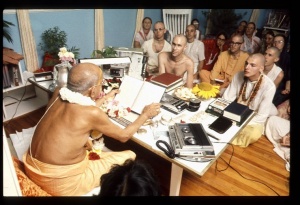SB 3.21.25

A.C. Bhaktivedanta Swami Prabhupada
TEXT 25
- prajāpati-sutaḥ samrāṇ
- manur vikhyāta-maṅgalaḥ
- brahmāvartaṁ yo 'dhivasan
- śāsti saptārṇavāṁ mahīm
SYNONYMS
prajāpati-sutaḥ — the son of Lord Brahmā; samrāṭ — the Emperor; manuḥ — Svāyambhuva Manu; vikhyāta — well known; maṅgalaḥ — whose righteous acts; brahmāvartam — Brahmāvarta; yaḥ — he who; adhivasan — living in; śāsti — rules; sapta — seven; arṇavām — oceans; mahīm — the earth.
TRANSLATION
The Emperor Svāyambhuva Manu, the son of Lord Brahmā, who is well known for his righteous acts, has his seat in Brahmāvarta and rules over the earth with its seven oceans.
PURPORT
Sometimes it is stated that Brahmāvarta is a part of Kurukṣetra or that Kurukṣetra itself is situated in Brahmāvarta, because the demigods are recommended to perform spiritual ritualistic performances in Kurukṣetra. But in others' opinion, Brahmāvarta is a place in Brahmaloka, where Svāyambhuva ruled. There are many places on the surface of this earth which are also known in the higher planetary systems; we have places on this planet like Vṛndāvana, Dvārakā and Mathurā, but they are also eternally situated in Kṛṣṇaloka. There are many similar names on the surface of the earth, and it may be that in the Boar age Svāyambhuva Manu ruled this planet, as stated here. The word maṅgalaḥ is significant. Maṅgala means one who is elevated in every respect in the opulences of religious performances, ruling power, cleanliness and all other good qualities. Vikhyāta means "celebrated." Svāyambhuva Manu was celebrated for all good qualities and opulences.